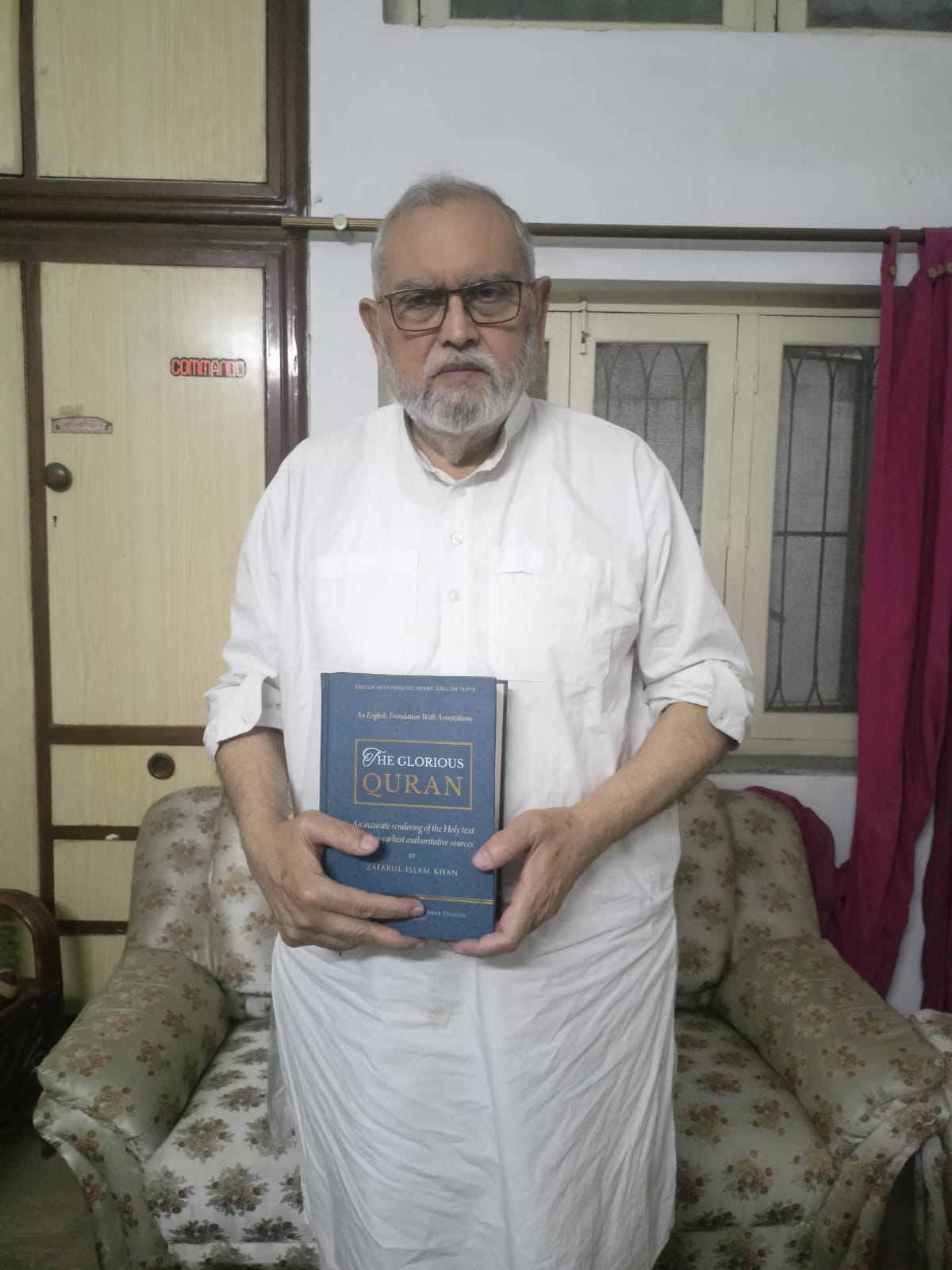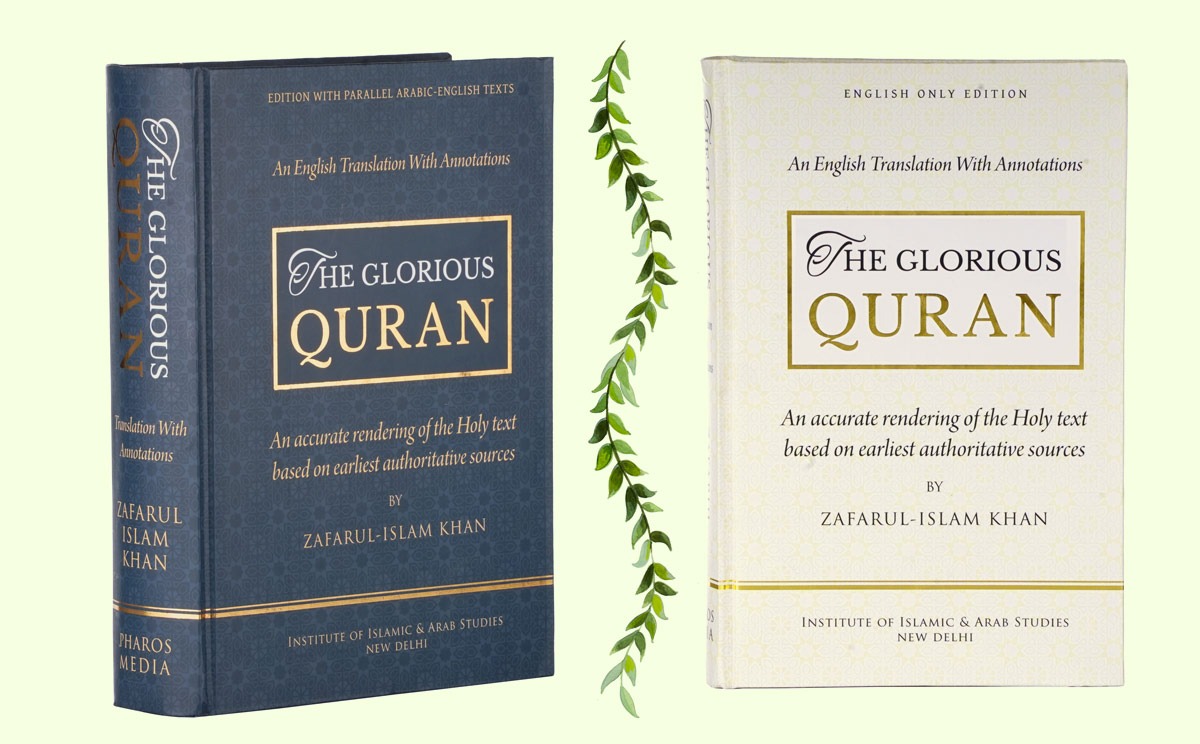Interview With Dr. Zafarul Islam Khan on His New English Translation of the Quran

Hasan Zia Rizvi/ TwoCircles.net
Dr. Zafarul Islam Khan, a 75-year-old Indian scholar, has published a new translation of the Quran, the holy book of the Muslims. It is the first significant contribution to the English translation of the Quran by an Indian scholar since the popular 1930s translation by Indian barrister Abdullah Yusuf Ali, which has long held sway in Indian households.
Dr. Khan studied at Al-Azhar and Cairo universities, received his PhD in Islamic Studies from Manchester University, and has written over 50 books on various topics in Arabic, English, and Urdu. He embarked on a journey to provide a more accurate rendering of the Holy Quran based on the earliest authoritative resources. His groundbreaking work seeks to rectify inaccuracies and nuances often overlooked in the translation process.
The linguistic nuances of Quranic Arabic, which differ from Arabic spoken and written in the Arab world, presented a unique challenge, according to Dr. Khan, who dedicated eleven years to meticulously revising and transforming Abdullah Yusuf Ali's translation.
Dr. Khan's goal was not just to rectify inaccuracies, but also to address outdated language and poetic elements present in Ali's translation. The end product is an entirely new translation, supplemented with over two thousand new comments and extensive appendices covering numerous aspects of the Quran.
Dr. Khan's translation includes a chapter illustrating the differences between Biblical and Quranic narratives. This chapter dives into over fifty characters and events found in the scriptures, highlighting variances and important additions. According to Dr. Khan, while the Quran and the Bible share a common source, the Quran has remained unaltered over the millennia, preserving its pristine form and linguistic essence.
Another distinguishing feature of the book is a note in the introduction that highlights scientific indications found in the Quran. The author presents a succinct description of fascinating scientific findings, such as the Quran's mention of particles smaller than an atom, the anticipation of future discoveries, and the fascinating phenomena of two streams of water not mixing.
Two Circles spoke to Dr. Khan about his new English translation of the Quran.
Can you provide examples of verses that may have different interpretations and how your translation addresses these nuances?
Certainly. One example is the verses regarding the concept of "killing the Kafirs," which has been widely misunderstood globally. In my translation, I have provided annotations to offer both meanings accepted by different sections of readers.
In Surah 9, verse 5, the Quran states: “But once the Sacred Months have passed, kill the polytheists—those who violated their treaties—wherever you find them, capture them, besiege them, and lie in wait for them in every way. But if they repent, perform prayers, and pay alms-tax, then set them free. Indeed, Allah is All-Forgiving, Most Merciful.”
It’s crucial to note that in this verse, the term “polytheists” specifically refers to those individuals in Arabia, particularly in the proximity of Mecca and Medina, who had previously entered into a treaty with the Muslims. The directive is contextualized to address the circumstances of that specific time and region, emphasizing the importance of understanding the historical and cultural context to interpret the Quran accurately.
What were the major challenges you encountered during the translation process and how did you overcome them?
The translation process posed several challenges, and to overcome them, I sought advice from 70 Islamic scholars, Arabic professors, and linguistic experts. By incorporating their suggestions, I aimed for accuracy. One significant challenge was ensuring clarity for ordinary Muslim and non-Muslim readers, considering the absence of this approach in many existing translations. It was crucial to prevent misunderstandings that could be exploited by enemies of Islam.
I strongly advocate for the unity of Muslims under the banner of one Quran, rejecting the divisive nature of sectarianism within Islam. Throughout my work, I have confronted the challenge posed by varying interpretations across different sects in Islam with an unwavering commitment to unbiased and honest representation. In instances where conflicting interpretations arise in certain verses, I have taken a transparent approach, presenting both versions without imposing a definitive judgment on correctness. Instead, I guide readers toward the most authentic and accurate understanding, urging for acknowledgment and acceptance by every Muslim.

For readers engaging with your translation, what advice or guidance would you offer to enhance their understanding and appreciation of the Quran?
My advice to readers is to focus on authentic translations and avoid unauthentic interpretations. The copious annotations in my book are designed to clarify various authentic interpretations related to each verse. By engaging with these annotations, readers can gain a more nuanced and accurate understanding of the Quranic text.
The addition of comparative narratives of the Quran and the Bible, and scientific indications adds an extra layer of depth to the reader’s exploration of the Quran, inviting them to contemplate the intersection of science and spirituality within its verses.
Are there any future projects or works related to Quranic translation or Islamic scholarship that you are currently undertaking or planning?
Currently, I am working on the indexing of the Quran, which I hope to publish soon. This project aims to provide readers with a valuable tool for navigating the Quranic text, enhancing their overall experience and comprehension.
(Quran indexing is a way to organize the Quran by grouping verses based on related topics, titles, and contents.)
Dr. Zafarul Islam Khan's translation stands as a testament to meticulous scholarship, offering readers a deeper understanding of the Quranic text and its unique position in the literary and spiritual landscape.
The translation is published by the Delhi-based Pharos Media, in two editions. The first edition is priced at INR 1195 or USD 49 and includes both the Arabic text and its English translation in parallel. Alternatively, the second edition is available for INR 795 or USD 39 and features the English translation without the parallel Arabic text. Orders can be placed through [email protected].
Hasan Zia Rizvi is an independent reporter based in Lucknow, India.
